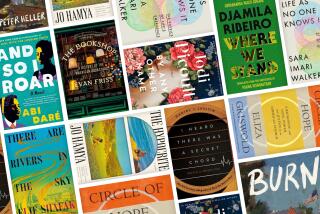Inside ‘The Magic Circle,’ a fictional game blurs reality and ritual
Muriel Spark understood better than most novelists the peculiar fascination of hermetic worlds. She set “The Prime of Miss Jean Brodie” in a Scottish girls day school, “The Abbess of Crewe” in a convent run like the C.I.A. and her last novel, “The Finishing School,” at a Swiss academy of questionable ethics.
Jenny Davidson, a comparative literature professor at Columbia University and fiction writer, has inspired Sparkian comparisons with her new novel, “The Magic Circle,” which focuses on a strange subset society all its own — the brainy bubble of Columbia University’s Morningside Heights neighborhood. The book lacks Spark’s comic brio and nifty legerdemain, but there’s an adventurous imagination at play and Davidson’s formidable intelligence is like an electric current running through the pages of this compendious book.
Unfolding in an academic zone of privilege and prestige zigzagging along an occasionally menacing urban landscape, “The Magic Circle” is populated by intellectuals and artists who converse in a rarefied patois. At the corner pub, the word “Foucauldian” is chomped with beer nuts and characters are identified by their interest in such esoteric pursuits as “simulation and locative games.”
Games are both a central activity and a philosophical subject of “The Magic Circle,” which centers on three female characters: Ruth, a control-freak postdoctoral fellow who specializes in game theory and design; Lucy, Ruth’s Taiwanese-American roommate and factotum, who’s completing a graduate writing degree in poetry and is somewhat more comfortable observing life than experiencing it directly; and Anna, a brilliant and alluring Swedish sociologist with a radical temperament and worrying psychiatric history.
Living in university-owned apartments, these women bond over wine, outrageous Truth or Dare antics and high-flown discussion of the project Ruth has devised called “Trapped in the Asylum.” This pedagogical treasure hunt invites participants to explore the story of a 19th century journalist who, on assignment for his newspaper, had himself committed to a mental hospital that was once on grounds that are now part of the campus.
Anna, trailing an air of seductive European mystery and danger, decides to improvise a game of her own also revolving around the history of Morningside Heights. But her goal is to blur the boundary between reality and ritual — and perhaps sanity and madness as well.
“Don’t you want to work on the larger scale of creation and destruction, in a world where something’s actually at stake, rather than always with this meticulous preservation of proprieties?” Anna asks Ruth, challenging her to crack through her protective academic shell.
When Anders, Anna’s stunningly beautiful and even more anarchic brother, turns up unexpectedly, the games are taken to a new level. He organizes a live-action version of Euripides’ “The Bacchae,” with Anna taking on the role of Dionysus and Ruth, who becomes erotically captivated by Anders, taking on the role of Pentheus, the uptight young king who fatally tries to quash the ecstatic, bloody cult of this languorous, troublemaking deity.
The women ceremoniously enact their character differences, in a novel that falls “into the patterns of melodrama” more often “than ideally mandated by the aesthetic proprieties of tasteful storytelling.” These words are used by Davidson in a different context, but they hint at her awareness of her own increasingly farfetched fictional game.
Blending first- and third-person narration with blog posts, group chat, and diary entries in a prose style that is precise and efficient though rarely luminous, the book hurtles headlong toward a catastrophic finish. Davidson manages the suspense of her tragedy better than she handles moments of recognition and revelation.
The strength of “The Magic Circle” lies in the way the novel’s three intellectually accomplished female characters simultaneously complement one another’s cleverness and expose one another’s blind spots. But in Davidson’s commendable ambition to provide them with a rambunctious story line worthy of their cultivated minds, the spirited plot is allowed to eclipse its fascinating players.
The Magic Circle
A Novel
Jenny Davidson
New Harvest: 196 pp., $15.95
More to Read
Sign up for our Book Club newsletter
Get the latest news, events and more from the Los Angeles Times Book Club, and help us get L.A. reading and talking.
You may occasionally receive promotional content from the Los Angeles Times.










